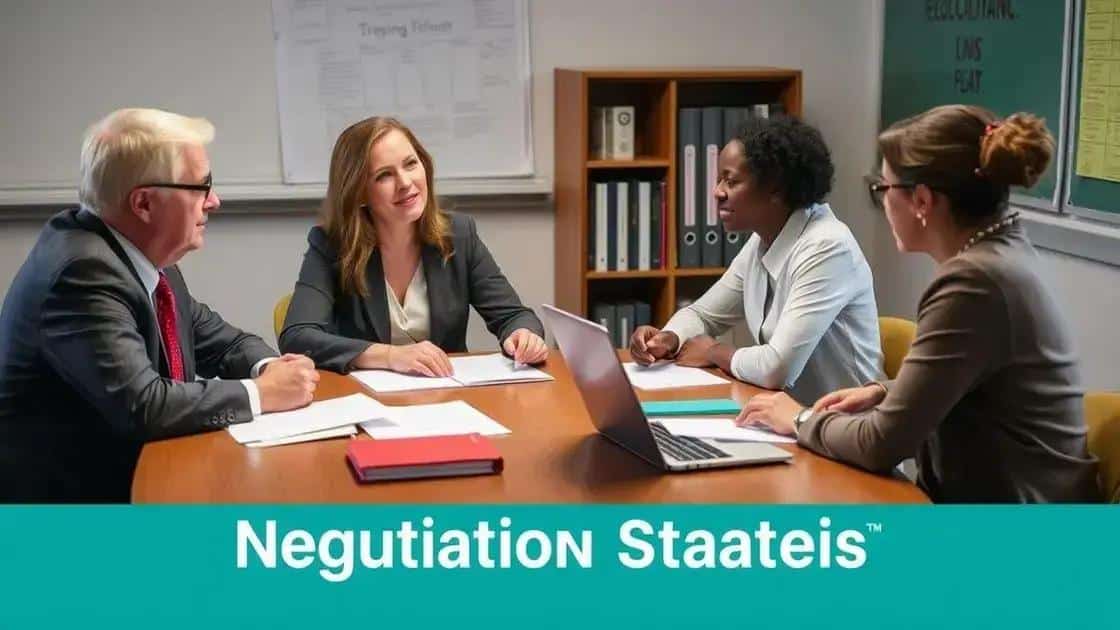Teacher compensation negotiation tactics that work

Anúncios
Building a supportive community for teachers enhances collaboration, improves job satisfaction, and leads to better educational outcomes by fostering connections among educators and engaging families in the school environment.
Teacher compensation negotiation tactics can significantly impact the outcome of salary discussions. Have you ever wondered how you can effectively advocate for yourself? Let’s explore some strategies that can empower educators to secure better pay.
Anúncios
Understanding the importance of fair compensation
Understanding fair compensation for teachers is crucial. It impacts not only their financial well-being but also the quality of education. In today’s educational landscape, teachers must be aware of their worth and the value they bring to their communities.
Why Fair Compensation Matters
Fair compensation ensures that teachers feel valued for their hard work. When educators are adequately compensated, they can focus on their primary goal: educating students effectively.
Anúncios
Moreover, strong teacher salaries can lead to:
- Increased job satisfaction, which translates to better classroom performance.
- Lower turnover rates, ensuring that students benefit from experienced teachers.
- A more motivated teaching staff, creating a positive learning environment.
Economic Impact of Teacher Salaries
The economic implications of fair teacher compensation extend beyond the classroom. When teachers earn fair wages, they contribute more to the local economy through spending.
Furthermore, schools with competitive salaries tend to attract more qualified candidates. This, in turn, raises the overall educational standards in the community.
Every dollar invested in teacher salaries can lead to significant returns, benefiting both students and society.
Raising Awareness
Teachers must share their experiences regarding compensation with their peers and communities. Advocacy for fair pay can lead to systemic changes that benefit everyone in education.
By working together, teachers can develop a strong voice in negotiations. Remember, teacher compensation negotiation tactics are essential for paving the way for better outcomes.
Key negotiation strategies for teachers

Negotiating effectively is a vital skill for teachers aiming to secure better salaries and benefits. Understanding key negotiation strategies can empower educators to advocate for themselves confidently.
Research and Preparation
Before entering any negotiation, teachers should gather information about salary standards and benefits in their region. Knowing the average salary for teachers with similar experience can strengthen their position.
Additionally, preparing a list of accomplishments can be beneficial. Highlighting achievements such as:
- Improving student test scores.
- Implementing successful programs.
- Participating in professional development.
Practice Effective Communication
Communication plays a crucial role in any negotiation. Teachers should practice how to articulate their value clearly. Using “I” statements can be powerful: for example, “I have contributed to increasing our school’s academic performance.” This technique personalizes the conversation and emphasizes their role.
Active listening is equally important. By understanding the needs of the administration, teachers can tailor their arguments to align with school goals and resources.
Be Open to Compromise
Effective negotiators know when to be flexible. While having a clear goal is essential, being open to alternatives can lead to successful outcomes. For instance, if a higher salary is not feasible, consider negotiating additional benefits, such as more professional development opportunities or better classroom resources.
Being willing to compromise facilitates teamwork and demonstrates professionalism, which can lead to stronger relationships with school administrators.
These key negotiation strategies for teachers can enhance their ability to secure fair compensation. By preparing thoroughly, communicating effectively, and remaining flexible, educators can navigate negotiations with confidence and determination.
How to prepare for a negotiation meeting
Preparing for a negotiation meeting is crucial for teachers aiming to secure their desired compensation and benefits. With careful preparation, educators can approach these discussions with confidence and clarity.
Gather Relevant Information
The first step in preparing is to gather all relevant information. Research the average salaries for teachers in your area and understand the budget constraints of your school. This knowledge gives you a solid foundation.
Also, create a list of your accomplishments and contributions. Highlight specific achievements like:
- Years of teaching experience.
- Successful programs you have implemented.
- Professional development courses you have completed.
Practice Your Pitch
It’s important to practice your negotiation pitch before the meeting. Rehearse what you plan to say and how you wish to present your case. Mock negotiations with friends or colleagues can help refine your communication skills and boost your confidence.
Make sure to communicate your needs clearly. Using “I” statements can be very effective. For instance, saying, “I believe my experience in enhancing student outcomes makes me a valuable asset,” personalizes your argument and reinforces your worth.
Prepare for Questions
Anticipating questions and objections from school administrators is also essential. Consider how they might respond to your requests. Prepare thoughtful answers that highlight your readiness to negotiate constructively.
Being prepared shows professionalism and commitment. It indicates that you take the negotiation seriously and are ready to engage in a meaningful discussion.
All these steps will help you feel more confident and prepared for your meeting. Remember, effective preparation can significantly influence the outcome of your negotiation. By employing these strategies, you empower yourself and seek the fair compensation you deserve.
Building a supportive community for teachers

Building a supportive community for teachers is essential for professional growth and job satisfaction. When teachers work in a positive and collaborative environment, everyone benefits, especially students.
Connecting with Colleagues
One effective way to foster a supportive community is by connecting with colleagues. Teachers can share tips, resources, and experiences. This can occur through regular meetings or informal gatherings. Strong relationships among staff create a sense of belonging and offer emotional support.
Consider creating or participating in teacher groups, such as:
- Subject-focused teams that align on curriculum and resources.
- Mentoring programs where experienced teachers guide new educators.
- Social gatherings that foster camaraderie outside school hours.
Encouraging Open Communication
Open communication is vital in a teacher community. Administrators and staff should foster an environment where teachers feel comfortable sharing their thoughts and concerns. Regular feedback sessions can help identify issues and celebrate successes.
This creates transparency and trust among staff, making it easier for teachers to express their needs and work collaboratively towards solutions.
Engaging with the Wider Community
Building ties with the wider community also strengthens support for teachers. Parents and local organizations can play a significant role in creating a beneficial environment for educators.
Encouraging family involvement in school activities promotes a positive atmosphere. Teachers can engage with the community by:
- Hosting events that welcome parents and local businesses.
- Creating partnerships with local organizations for resources.
- Sharing success stories with the community to build goodwill.
A supportive community for teachers not only enhances their experience but also improves student outcomes. Together, educators can create a nurturing environment that benefits everyone involved.
FAQ – Frequently Asked Questions about Building a Supportive Community for Teachers
Why is a supportive community important for teachers?
A supportive community helps teachers feel valued, improves job satisfaction, and ultimately enhances student outcomes.
How can teachers connect with their colleagues?
Teachers can build connections through regular meetings, mentoring programs, and social gatherings that foster camaraderie.
What role do families play in supporting teachers?
Engaging families in school activities promotes a positive atmosphere and strengthens the support network for teachers.
How can open communication be established among educators?
Encouraging an environment of open communication allows teachers to share ideas, concerns, and feedback, leading to a more collaborative atmosphere.





